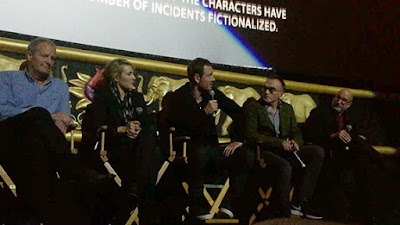 |
| Daniels, Winslet, Fassbender, Boyle, and the moderator |
The film was terrific. In many ways, it completes the story of The Social Network in its exploration of drive and genius and if/how compassion fits into the equation. "It's not binary," Seth Rogan's Steve Wozniak says, "You can be decent and gifted at the same time." Does one preclude the other? How can a character so brilliant but narrow-minded ever hope to demonstrate empathy? Who is selected? Who is rejected? Steve Jobs gives us an answer that's both more complete and more complicated than that of The Social Network. It's less about the iMan and iMyth and more about a mortal who needs to become a better father. A solid arc, and well-traced.
Each panelist had a chance to speak at length about the process of bringing the story of a household name into the movie theater. Sorkin himself had several wise words to share. "Don't judge your characters," he said. The motivation of every character - protagonist, antagonist, and everyone in between - should be relatable. We should understand why a character feels they have to do what they do. Even if desperate circumstances shove them into tragic action, they must feel as though their every action is justified - as eloquently and passionately as possible. "I write them as if they're defending themselves to God," Sorkin said.
Jeff Daniels had an insightful take on Sorkin's script: "Even the supporting characters have a beginning, middle, and end."
 Sorkin agreed with Daniels's take, saying, "I always considered it an ensemble movie." Subplots carry the emotional threads of the story, and subplots are relationships. As such, as subplots evolve, so too does the emotional journey of the protagonist.
Sorkin agreed with Daniels's take, saying, "I always considered it an ensemble movie." Subplots carry the emotional threads of the story, and subplots are relationships. As such, as subplots evolve, so too does the emotional journey of the protagonist.Sorkin also discussed the importance of creating flawed, relatable characters. "To me, Hercules, Zeus, any godlike figure doesn't interest me. Humans are much more inspiring. To know that someone is just like us - all of these flaws in Steve aside, to know that these people are capable of frankly much more than I'm capable of, I find very inspiring. I often if not always write about people who are smarter than I am, and it's my way of spending time in a world of great accomplishment."
A quick note to aspiring directors: The day before I went to NY, I was in a theater to see The Martian. I overheard a family discussing Steve Jobs and a child piped up, "Is that the one with the guy who looks nothing like Steve Jobs?"
It's a common first-time director's mistake to cast an actor based on how they match your vision's physical expectations. However, when it comes to casting and directing, you want an actor who emotionally embodies the character more than one who looks like your ideal. For reference, I point to the example of Louise Fletcher in One Flew Over the Cuckoo's Nest. In the Ken Kesey novel, Nurse Ratched was elderly, obese, and unattractive. Louise Fletcher was none of those things, but she still embodied a monstrous character so chilling that the emotional temperature dropped 50 degrees every time she strolled into the room. And she won an Academy Award! Looks are important, but your primary casting consideration is emotional intelligence - not physical attributes. At the Q&A, Fassbender himself said, "Danny told me he didn't want to go down the avenue of physical resemblance: he wanted to find the essence." Danny Boyle did it right. See this film.
Write on.
*
Jared teaches screenwriting at Emerson College and Salem State University. His creative work has appeared on MTV Networks, in the Tribeca Film Festival, and the Austin Film Festival. He offers screenplay coverage at www.screenplay.guru.
No comments:
Post a Comment